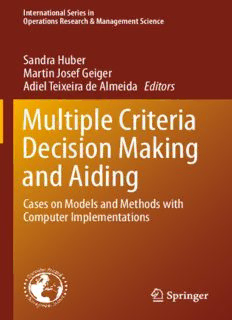Table Of ContentInternational Series in
Operations Research & Management Science
Sandra Huber
Martin Josef Geiger
Adiel Teixeira de Almeida Editors
Multiple Criteria
Decision Making
and Aiding
Cases on Models and Methods with
Computer Implementations
International Series in Operations Research
& Management Science
Volume 274
SeriesEditor
CamilleC.Price
StephenF.AustinStateUniversity,TX,USA
AssociateSeriesEditor
JoeZhu
WorcesterPolytechnicInstitute,MA,USA
FoundingSeriesEditor
FrederickS.Hillier
StanfordUniversity,CA,USA
Moreinformationaboutthisseriesathttp://www.springer.com/series/6161
Sandra Huber • Martin Josef Geiger (cid:129)
Adiel Teixeira de Almeida
Editors
Multiple Criteria Decision
Making and Aiding
Cases on Models and Methods with Computer
Implementations
123
Editors
SandraHuber MartinJosefGeiger
LogisticsManagementDepartment LogisticsManagementDepartment
Helmut-Schmidt-University/Universityof Helmut-Schmidt-University/Universityof
theFederalArmedForcesHamburg theFederalArmedForcesHamburg
Hamburg,Germany Hamburg,Germany
AdielTeixeiradeAlmeida
UniversidadeFederaldePernambuco
Recife,Pernambuco,Brazil
ISSN0884-8289 ISSN2214-7934 (electronic)
InternationalSeriesinOperationsResearch&ManagementScience
ISBN978-3-319-99303-4 ISBN978-3-319-99304-1 (eBook)
https://doi.org/10.1007/978-3-319-99304-1
LibraryofCongressControlNumber:2018962934
©SpringerNatureSwitzerlandAG2019
Thisworkissubjecttocopyright.AllrightsarereservedbythePublisher,whetherthewholeorpartof
thematerialisconcerned,specificallytherightsoftranslation,reprinting,reuseofillustrations,recitation,
broadcasting,reproductiononmicrofilmsorinanyotherphysicalway,andtransmissionorinformation
storageandretrieval,electronicadaptation,computersoftware,orbysimilarordissimilarmethodology
nowknownorhereafterdeveloped.
Theuseofgeneraldescriptivenames,registerednames,trademarks,servicemarks,etc.inthispublication
doesnotimply,evenintheabsenceofaspecificstatement,thatsuchnamesareexemptfromtherelevant
protectivelawsandregulationsandthereforefreeforgeneraluse.
Thepublisher,theauthorsandtheeditorsaresafetoassumethattheadviceandinformationinthisbook
arebelievedtobetrueandaccurateatthedateofpublication.Neitherthepublishernortheauthorsor
theeditorsgiveawarranty,expressorimplied,withrespecttothematerialcontainedhereinorforany
errorsoromissionsthatmayhavebeenmade.Thepublisherremainsneutralwithregardtojurisdictional
claimsinpublishedmapsandinstitutionalaffiliations.
ThisSpringerimprintispublishedbytheregisteredcompanySpringerNatureSwitzerlandAG
Theregisteredcompanyaddressis:Gewerbestrasse11,6330Cham,Switzerland
Preface
This volume presents a collection of recent, state-of-the-art cases on problems
andsolutionmethodsin multi-criteriadecision-makingandmulti-criteriadecision
aiding (MCDM/MCDA). The research area of MCDM/A has a considerable rich
history and brings together several different disciplines, including mathematics,
engineeringsciences,psychology,economics,and,morerecently,computerscience.
The remarkable background of the field of multi-criteria decision-making and
aiding is underlined by the existence of an international series of conference on
MCDM, datingbackto 1975.Besides, summerschoolsdedicatedto young(PhD)
students/researchersareorganizedsince1983.We,theeditorsofthisvolume,have
contributedto thisfield, also byservingas organizersofsuchevents,andwe now
contributeoncemoretotheareaofMCDMwiththisvolume.
When collecting contributions for this book, particular attention was paid to
the applicability of the chapters for educational purposes, such as the MCDM/A
Summer Schools or university courses on multi-criteria decision aiding/making.
Besides the focusonparticulartopics, attentionwas paid to the actualapplication
ofaparticularmethodtoagiven(business)casestudy.Thelattertypicallyincludes
the implementation of the presented method in a computer system, often realized
in a prototypicalfashion.We can tell from ourexperiencethatapplyinga method
toaproblemallowsforaparticulardeeplearningexperience,andinthisspirit,we
believethechaptersofthisbooktobe.
The bookgatherstenchapters,whichare preparedbyexpertsin the MCDM/A
area.Ashortdescriptionofeachchapterissubsequentlyprovided.
Chapter1,named“BenchmarkingUsingDataEnvelopmentAnalysis:Applica-
tion to Stores of a Post and Banking Business” by Andrea Raith, Paul Rouse and
LawrenceM.Seiford,dealswiththeimplementationofdifferentDataEnvelopment
Analysis(DEA)modelsinordertoassessthequalityofpostandbankingstores.An
introductiontoDEAandlinearprogrammingmodelsisprovidedtounderstandthe
overallsolutionconcept.Moreover,theauthorsproposeapyDEAsoftwareinorder
toconductasupportedDEAanalysis.
Chapter 2, entitled “Evaluating the Quality of Radiotherapy Treatment Plans
for Prostate Cancer” by Emma Stubington, Matthias Ehrgott, Glyn Shentall and
v
vi Preface
OmidNohadani,isdedicatedtotheevaluationofradiotherapytreatmentplantsfor
prostatecanceratRosemareCancerCentreintheUnitedKingdom.Oneofthemain
contributionsistheimplementationofaDEAmodelinordertoperformarelative
performanceanalysisonthetreatmentplans.
Chapter 3, called “DESDEO: An Open Framework for Interactive Multiob-
jective Optimization” by Vesa Ojalehto and Kaisa Miettinen, introduces an open
source framework that is devoted to solve multiobjective problems interactively.
Theauthorsgiveadetailedoverviewoftheframeworksclassstructureincludingthe
handlingofpreferencesofthedecision-maker.Furthermore,adetaileddescription
onthesolutionprocesswiththeframeworkispresentedonariverpollutionproblem.
Chapter4,giventhetitle“IntegratingManagerialPreferencesintotheQualita-
tiveMulti-CriteriaEvaluationofTeamMembers”byAnnBarcomb,NicolasJullien,
Patrick Meyer and Alexandru-Liviu Olteanu, is devoted to support the manager
with the evaluationof teammembers.An experimentforan opensource software
development team is carried out and reproduced by using an MCDA package in
theRenvironment.Asaresult,rulesonthecontributionsofteammemberscanbe
providedtothemanager.
Chapter5,entitled“RobustRankingofUniversitiesEvaluatedbyHierarchical
and Interacting Criteria” by Salvatore Corrente, Salvatore Greco and Roman
Słowin´ski, tackles the ranking of universities taking into account several aspects,
such as research output. In order to establish the ranking, a multiple criteria
hierarchy process is applied. To aggregate the different university performances,
the Choquet integralis used to include possible negativeand positive interactions
betweenthecriteria.
Chapter 6, called “A Multiple Criteria Approach Defining Cultural Adaptive
Reuse of Abandoned Buildings” by Ana Sara Costa, Isabella M. Lami, Salvatore
Greco, José Rui Figueira and José Borbinha, addresses the evaluation of reusing
abandonedbuilding in Turin, Italy. In particular, nine criteria are investigatedand
a nominal classification method is applied. Detailed descriptions are given that
showhowtheproblemathandcanbesolvedwiththedecisionsupportframework
DecSpace.
Chapter7,named“AssigningRegionstoSalesRepresentativesatPfizerTurkey”
byMuratKöksalanandSakineBatun,presentsadetaileddescriptionontheproblem
how to assign sales representatives to regions incorporating the information you
receive from the manager of the Pfizer company, e.g. information on the sales in
thepharmaceuticalsectorisgiven.Furthermore,detailednotesandsuggestionsfor
furtheranalysisonthemultiobjectiveproblemareprovided.
Chapter8,withthetitle“CollaborativeManagementofEcosystemServicesin
NaturalParksBased onAHP and PROMETHEE” byMarina Segura,Concepción
Maroto, Valerie Belton, ConcepciónGinestar and InmaculadaMarqués, examines
themanagementofecosystemsbyanalyzingproductionservices,ecosystemmain-
tenance and effects on citizens. Detailed illustrations on the applicability of an
AnalyticHierarchyProcessarepresentedforanaturalparkintheValencianregion
usinganimplementationinExcel.
Preface vii
Chapter 9, specified as “Using FITradeoff for Supporting a Decision Process
of a Multicriteria Decision Problem” by Eduarda Asfora Frej, Adiel Teixeira de
AlmeidaandDanielleCostaMorais,introducesa flexibleandinteractivetrade-off
methodtoassistthedecision-makerinfindinghis/hermostpreferredsolution.The
authorsexplainstepbystephowtoapplytheproposedmethodfortwocasestudies,
whichareasupplierselectionproblemaswellasafacilitylocationproblem.
Chapter 10, termed “Lean and Green Supplier Selection Problem: A Novel
Multi Objective Linear Programming Model for an Electronics Board Manufac-
turing Company in Turkey” by Ahmet Çalık, Turan Paksoy and Sandra Huber,
focuses on a group decision-making process with three phases based on a Fuzzy
Analytical Hierarchical process. The solution approach is successfully illustrated
foranelectronicsboardmanufacturingcompanyinTurkey.
Hamburg,Germany SandraHuber
Hamburg,Germany MartinJosefGeiger
Recife,Brazil AdielTeixeiradeAlmeida
Acknowledgements
Compilingsuch a volumeis quite some effort.We would like to thankeverybody
whohelpedinthisprocess.Firstandforemost,ourthanksgototheauthorsofthe
chapters.Eachandeveryoneofthemcontributedwithanoriginalwork.Then,we
owe thanks to the (here kept anonymous) referees, who undertook the important
task of reviewing each contribution. Last, not least we thank Christian Rauscher,
BarbaraBethkeandtheirpublishingteamfromSpringerfortheirenduringsupport
and patience during the production of this volume. We may summarize the past
workwiththeesteemedauthors,ourrefereesandthepublishinghouseSpringeras
apositive,verypleasantexperience.
ix
Contents
Benchmarking UsingDataEnvelopmentAnalysis:Application
toStoresofaPostandBankingBusiness...................................... 1
AndreaRaith,PaulRouse,andLawrenceM.Seiford
Evaluating the Quality of RadiotherapyTreatment Plans for
ProstateCancer .................................................................. 41
EmmaStubington,MatthiasEhrgott,GlynShentall,andOmidNohadani
DESDEO:AnOpenFrameworkforInteractiveMultiobjective
Optimization...................................................................... 67
VesaOjalehtoandKaisaMiettinen
Integrating Managerial Preferences into the Qualitative
Multi-CriteriaEvaluationofTeamMembers................................. 95
AnnBarcomb,NicolasJullien, PatrickMeyer,andAlexandru-Liviu
Olteanu
RobustRanking ofUniversitiesEvaluatedby Hierarchicaland
InteractingCriteria.............................................................. 145
SalvatoreCorrente,SalvatoreGreco,andRomanSłowin´ski
AMultipleCriteriaApproachDefiningCulturalAdaptiveReuseof
AbandonedBuildings............................................................ 193
AnaSaraCosta,IsabellaM.Lami,SalvatoreGreco,JoséRuiFigueira,
andJoséBorbinha
AssigningRegionstoSalesRepresentativesatPfizerTurkey............... 221
MuratKöksalanandSakineBatun
CollaborativeManagementofEcosystemServicesinNaturalParks
BasedonAHPandPROMETHEE ............................................ 231
MarinaSegura,ConcepciónMaroto,ValerieBelton,ConcepciónGinestar,
andInmaculadaMarqués
xi
Description:This book introduces students on Multiple Criteria Decision Aiding and Making courses to practical, real-world cases. Each case study introduces a problem or situation together with a method, and a description and explanation of a computer application. In this sense each chapter is based on four pil

